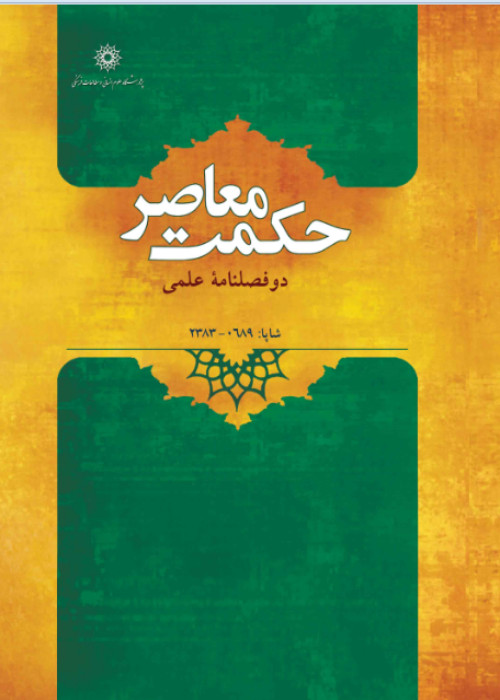Suhrawardī’s Epistemology of Testimony; an Analytical and Historical Approach
It is only in the last few decades that testimony has been seriously studied in epistemology. But in the Islamic world, testimony by necessity has been paid attention earlier. Epistemology of testimony, in Islamic tradition, began by jurists, who had nothing in their hand but the testimony of others for understanding religion and legal injunctions of God. Another line of study were philosophers and logicians, who regarded testimony as one of the principles of judgement. At the same time that he was participating in these two lines of studies, Suhrawardī initiated a third line of study in his theology. In this paper, we will show Suhrawardī's contribution in this topic with two analytical and historical approaches.
Suhrawardī's Epistemology of Testimony:
Suhrawardī has spoken about testimony in three places of his works: in logic when enumerating the principles of judgements, in methodology of jurisprudence when discussing religious proofs, and in theology when talking about the doctrine of the nobler contingent to prove platonic forms.
Testimony in Suhrawardī's Logic:
al-Fārābī and Avicenna had talked about propositions taken from the testimony of others in their logic when discussing the first principles. With this in his hand, Suhrawardī begins to contemplate on the issue. He identifies two kinds of propositions that are related to testimony: accepted premises (maqbūlāt) and widely transmitted propositions (mutawātirāt). Accepted premises are propositions that we accept from someone we have good opinion of. In al-Talwīhāt, he adds that this good opinion is because of something celestial in that person or because he is more intelligent or religious. Widely transmitted premises are propositions that we become certain of because of the plethora of the testimonies of others. He, against others, does not require for what is testified to be perceptual/sensible. This is a smart move because he demonstrates the credibility of religious experience for the non-experiencer using exactly the widely transmitted propositions.Suhrawardī makes four important movements that are contrary to the Avicennan peripatetic tradition-four movements that cannot be simply passed by. They become clearer only when they are considered in the historical context and with regard to al-Ghazālī's statements. First of all, he eliminates Peripatetics’ intuitive propositions and innate propositions from the list of certain principles. Second, he brings widely transmitted and experiential propositions under one title. Thirdly, he gives them the name of intuitive propositions, while what he means by intuition is its literal meaning, not its peripatetic terminological meaning. And the fourth is that he attends to the role of evidences in them.It seems, from what we have said so far in addition to what will come in the next section from al-Ghazālī and his influence on Suhrawardī, that he thinks of the accumulated opinions as the reason why widely transmitted propositions are certain.
Testimony in Suhrawardī's Methodology of Jurisprudence:
One of religious proofs for understanding religion and legal injunctions of God is what is transmitted by testimony. Here, Suhrawardī takes one of al-Ghazālī's books-i.e., al-Mustaṣfā-and writes accordingly. One of al-Ghazālī's contributions in this discussion is that he eliminates intuitive propositions from the six self-evident propositions and introduces another sixth way to knowledge base on evidences. Suhrawardī takes the idea of evidences and their role in knowledge firmly. It is from here that we can see the idea of evidences in his philosophical works.He also mentions some requirements for the one who gives testimony such as being just and having good vision. This, and other things, could show that he is not totally individualist and internalist about testimony.
Testimony in Suhrawardī's Theology:
In theology, Suhrawardī, innovatively and for the first time, brings forward the discussion of testimony to prove the epistemological credibility of religious experience for the non-experiencer. Sometimes, testimony is in important matters and by experts. When that is the case, Suhrawardī says, one or two testimony is enough to become certain about what is testified. For example, when one or two astronomers testify about something related to their specialty, that brings us knowledge and certainty about that thing. This is the way of science. He continues that when this is so, the testimony of religious experiencers should also bring us knowledge. Here, testimony is as valuable as testimony in science, and even more valuable. This is because the number of testifiers here are more, they are sages and prophets that moral truth is certain in them, and their testimony is about what they have seen directly not what they have inferred from their observations.
Although Suhrawardī relies heavily on al-Fārābi, Avicenna, and al-Ghazālī, he makes a great contribution to the epistemology of testimony. His point that the certainty of widely transmitted propositions is because of the accumulated opinions developed by Shahīd Ṣadr later on. His brilliant innovation is that he brings forward the discussion of testimony to prove the epistemological credibility of religious experience for the non-experiencer.
- حق عضویت دریافتی صرف حمایت از نشریات عضو و نگهداری، تکمیل و توسعه مگیران میشود.
- پرداخت حق اشتراک و دانلود مقالات اجازه بازنشر آن در سایر رسانههای چاپی و دیجیتال را به کاربر نمیدهد.




